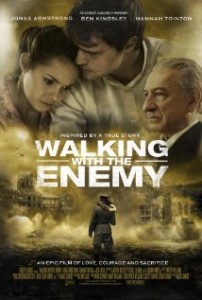Walking With the Enemy
Posted on April 24, 2014 at 6:00 pm
Why do we keep making movies about the Holocaust?
Because we are still trying to understand one of the most shocking, inhumane tragedies in history. Because it is the essence of heightened, dramatic storylines, with the most depraved real-life villains, the bravest heroes, and the direst moral dilemmas, the most devastating sacrifices. Because we have to ask ourselves, “What would I do?”
And because there are still stories left to tell. “Walking With the Enemy” is inspired by the true story of Pinchas Tibor Rosenbaum, a Hungarian student who escaped from a labor camp to help the “Glass House” workers forging Swiss citizenship papers to get Jews out of the country. He impersonated an SS officer to rescue Jews they were about to execute.
This first movie from the brand new Liberty Studios and first-time director Mark Schmidt is a tense and exciting story of a part of the Holocaust not widely known. Because Hungary’s Regent (played by Sir Ben Kingsley) made an alliance with Germany, the Nazis did not interfere with the country or its Jewish citizens for the first years of World War II. “I aligned Hungary with what I thought was the lesser of two evils.” 
But then, as Germany started to be hemmed in by the Allied forces, it took over Hungary and began to send Jews to labor camps and concentration camps. A heroic Swiss diplomat named Carl Lutz (played by William Hope) was given permission to issue 8000 passes to Hungarian Jews with family in Switzerland. He managed to get those passes to tens of thousands, who were able to escape the Nazis.
Handsome and likeable Jonas Armstrong (television’s “Robin Hood”) plays Elek Cohen, a character based on Rosenbaum. While his uncle worked with Lutz in the “Glass House” (called that because it had been a glass factory), helping to hide Jews, Elek wore a Nazi uniform to infiltrate Nazi offices and operations to free Jews about to be sent away or killed. Over and over, he takes terrible risks, knowing that even if he survives, he will fail more than he succeeds. “Why does it have to be you?” someone asks. “Because I have one thing left.”
The first-time director wisely worked with experienced filmmakers, especially cinematographer Dean Cundey (“Apollo 13,” “Jurassic Park”) and a capable cast of top British actors. The film is ably scripted, shot, and edited. The sound effects are exceptional; I don’t remember ever hearing gunshot sounds so sharp and directed. The story is very affecting. One oddly sterile note is that for a story about Jews, there is very little Jewish activity other than a blessing over a family dinner. Reminiscences of the Holocaust include many stories of Jews praying together and doing their best to observe rituals and worship, reciting the Shema as they were led to the gas chambers. Here, even those about to be shot by a firing squad do not say a prayer, an odd oversight in a story that is about those who were trying to preserve their right to maintain their religion and their community.
Parents should know that this is a WWII movie depicting events of the Holocaust. There are many scenes of wartime and anti-Semitic violence and many characters are injured and killed.
Family discussion: What was Elek’s toughest decision? Is it hard to help, knowing how much more cannot be fixed? What can we learn from Elek and Lutz? Who is most like them today?
If you like this, try: “Schindler’s List” and “Conspiracy”
